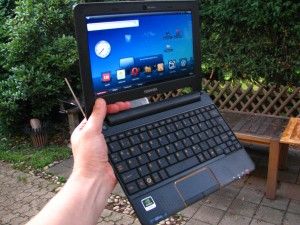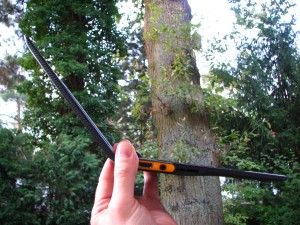 Fresh from the DHL van it’s the first Tegra2 device to hit the ground. Most will be calling the Toshiba AC100 [details] a smartbook and it certainly creates a smart impression. Super thin and light with a great-looking 1024×600 glossy screen and nice user interface. This may be running AOS (Android Open Source) 2.1 but it doens’t look like it. Toshiba have done a resonable job of filling in the gaps.
Fresh from the DHL van it’s the first Tegra2 device to hit the ground. Most will be calling the Toshiba AC100 [details] a smartbook and it certainly creates a smart impression. Super thin and light with a great-looking 1024×600 glossy screen and nice user interface. This may be running AOS (Android Open Source) 2.1 but it doens’t look like it. Toshiba have done a resonable job of filling in the gaps.
Plastics are a little on the cheap side but the keyboard is good as is the mouse-pad with scroll area and dual mouse buttons. One point to note is that the video player, while blowing me away with a 1080p playback and ability to handle a 8.5Mbps WMV and 6.5Mbps DivX out of the box, is somewhat buggy. Three lock-ups (requiring reboot) in the first hour left me feeling that the firmware was rushed out for IFA. Fortunately, Toshiba include an OTA firmware upgrade app so i’m going to be checking it regulaly.
Oh, the media player suppors uPnP devices too.
Finally: YouTube Unboxing Video now available.
We’ve also got three much longer videos from the live session:
2 – UI and Apps
3 – Deeper look at browsing, video, YouTube and other features.












Well, that was predictably disappointing. Currently, Android cannot keep up with other desktop OS’s. It’s a smart phone OS after all. Toshiba should have went with a Linux distro meant for desktop use. I don’t know why companies are so intent on cramming Android into everything. If it has a large screen, keyboard, a mouse and a powerful CPU then use a more capable OS.
i would say it could catch up quickly, if only google would get out of the way and allow some creativity. If this happens with 3.0, it’s about damn time.
It maybe probably could but right now it’s not. Putting Android on this type of device is the same as releasing a product with beta software.
If Android does start supporting more device form factors it might make the OS more and more bloated. Maybe Google’s Chrome OS (if you want to stay with Google but still in beta) or some other ARM based OS is the way to go.
not really sure how much bloat would be added, as most of the ui elements work already.
and honestly; if these products are not made in the first place, there will be no adaptions happening ever (chicken, eggs and all that).
I think if Toshiba and other companies went with a different Linux distro for these netbook like ARM devices, Google would likely hurry up with better Android support. Plus, the people who buy these can actually make some use of it with a more suitable OS.
Also, like with any software, the more features you add, the more bloated and slow it’lll get. Even Linus (guy who wrote the original Linux kernel) thinks Linux has become bloated (not as much as Windows of course). With each new feature added, the performance suffered.
Like say meego? To bad it seems to take its sweet time coming up with ARM versions.
As for the Linus quote, i think he was referring to the source code growing (mainly from drivers being added). This however do not affect performance much, as only the drivers actually needed are loaded. It will however make the kernel and accompanying modules take up a fair bit of storage on a generic distro. The kernel and modules on my desktop install takes up 184MB right now.
The difference between Linux and Windows however, is that the latter keep around a while bunch of stuff to maintain backwards compatibility. This is also a big source of security issues. For instance, i think one recent issue was related to a feature that had its origin in Windows 3.x…
And adding support for larger screens and a new mode of scrolling should not add that much bloat. Most of that is policy, not code, from what i can tell.
Nice Hardware, but Android just doesn’t fit…
Always on is nice, but people will expect a netbook like application experience. This is not a phone, this is some kind of laptop, so the expectations are on a higher level.
I would like to see how MeeGo performs on that hardware…
i am guessing the smaller usb port is for attaching to a different computer, device style.
Exactly. It turns the AC100 into the biggest 8GB USB stick ever!
or perhaps a usb hub, if whatever is plugged into the other ports is also made available upstream.
btw, i tested the textbox issue with opera mobile on their beta for maemo. It also lost text. Seems perhaps it happens because (at least on the maemo version) the text is not directly input into the box, but into some kind of buffer that fails to be transferred to the page itself.
overall i get the impression that there is no real showstoppers, just a whole lot of rough edges regarding this kind of project.
Th opera textbox issue is dangerous. You think its working and then you lose the text!
Doesn’t look like it’ll be selling very well. Seems less useful and less stable than an Android smart phone.
Ya, this thing will have worse sales than netbooks preloaded with Linux for the same reason.
i think i just figured out why the scroll behaves as it does. The scroll is seen as a wheel in android. That is, there is at present no real support for a scroll in android. There is only support for dpad, trackball (basically a rolling dpad) and a wheel (i think sonyericsson used that on their P-series symbian phones).
Somehow Opera Mobile picks up the scroll signal. Page up/down is super fast though so no real problem.
Perhaps because they reinterpret the wheel signal to something else then link scrolling. But the default Android behavior seems to make wheel and arrows behave pretty much the same. Not that surprising at it appears to be interchangeable in terms of menu navigation and so on.
I’d be more impressed if it was a convertible-tablet (swivel screen) type device. That, and it needs to have the full Android&Google apps suite (which will require that Google finish admitting that ChromeOS is still-born, and Android has stolen it’s thunder, thus allowing Android to take on the form factors and device capabilities they’ve reserved for ChromeOS).
in short … this android stuff is still very crncky and far from beeng a mature os worth its name – be it on smartphoes or other devices. for me it looks as if again the whole market is used (and et itself being used) as a large beta test field up til version 10 wich probably will resemble a ripe, mature os with adequate applications.
personally i therefore will not touch any of this google stuff for long while to go if any. it is lost time and money.
very good blog good info congrats. To get the best forex trading info click on the link
Thanks a lot